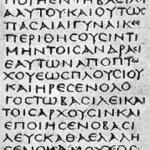In the discussions of Tom Wright in his recent opus, he stresses again and again that Christos is not merely a name, rather it regularly indicates that Jesus is the Jewish messiah, the anointed one of God. Here is reflection of another scholar, meditated to us by a fine post by Larry Hurtado that offers us a third choice…. which may break new ground. BW3
—
The Messianic Jesus in Paul’s Christology
by larryhurtado
Some time back, in a posting over on the blog site of our Centre for the Study of Christian Origins, I drew attention here to Matt Novenson’s book, Christ Among the Messiahs: Christ Language in Paul and Messiah Language in Ancient Judaism (Oxford University Press, 2012). Having re-read it as part of my preparation for a paper on “Paul’s Messianic Christology” for a conference in Rome in late June, I’m again impressed with the book, and want to reiterate my commendation of it.
Over against what has been the “majority position,” that “Christ” (Greek: χριστος) in Paul’s usage is essentially a colorless name, merely designating Jesus but not really carrying any connotative emphasis, Novenson lodges what I regard as a convincing counter-case.
Part of his case is to show that previous scholars have tended to work with only two “onomastic” categories: “Christ” in Paul is either a “title” (having strong connotative emphasis, as “messiah”) or a “name” (merely designating Jesus). Novenson cogently contends that there is a third category to consider, however: appellatives used as “honorifics,” i.e., a term so closely and particularly attached to an individual that it alone can designate that person, yet still carrying its connotation. As well-known examples, he cites “Augustus” (for Octavian), “Epiphanes” (for Antiochus IV), and Judas “Maccabee”. This seems to me a breakthrough of sorts beyond the philological impasse that has plagued Pauline scholarship.
Novenson’s contention is that in Paul “Christ” has this sort of function: It is closely and uniquely attached to Jesus, such that on its own it can designate him (as it does some 150 times in Paul’s letters), but it retains its semantic value (“meaning”) as “messiah.” This “honorific” category accounts for how “Christ” can seem to function almost like a name, and yet not really be reduced to functioning as a name.
Then, Novenson analyses a selection of Pauline passages, observing how they illustrate Paul’s use of “messianic language.” This analysis confirms the judgment that Jesus’ messianic status/significance really was an important claim for Paul.
Another creative feature of Novenson’s study is his emphasis that Paul’s use of messianic language should be seen as a “case study” in ancient Jewish messianic expressions. Many scholars have portrayed Paul’s Christological thought as a flat contrast with, or negation of, Jewish messianism. But, as Novenson argues, this seems to rest upon an over-simplified picture of Jewish messianic hopes that does not do justice to its diversity. Moreover, in light of Paul’s firm efforts to continue to be identified as Jewish, and his view of his gentile mission as securing “the obedience of the nations” to the biblical God and his Christ, Paul’s Christology is better seen as a particular (and distinctive) version in the diversity of ancient Jewish messianism.
I confess that perhaps part of my readiness to see the force of Novenson’s case is that I see it as reinforcing and sophisticating views that I’ve tried to express. But I also readily grant that Novenson’s case is a marked advance on anything previous, and in my view is now the starting point for any further consideration of how Paul’s Christology relates to ancient Jewish messianism.














